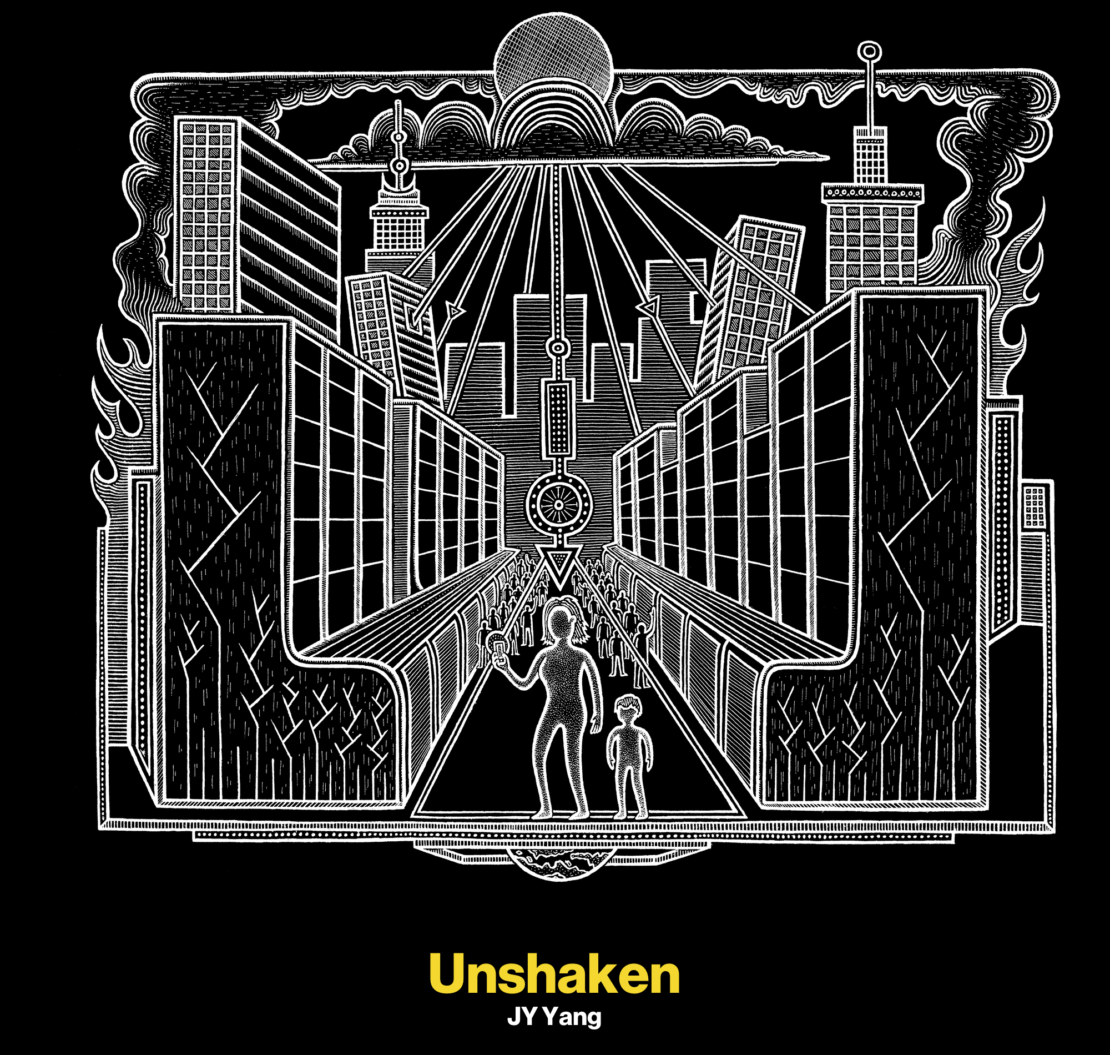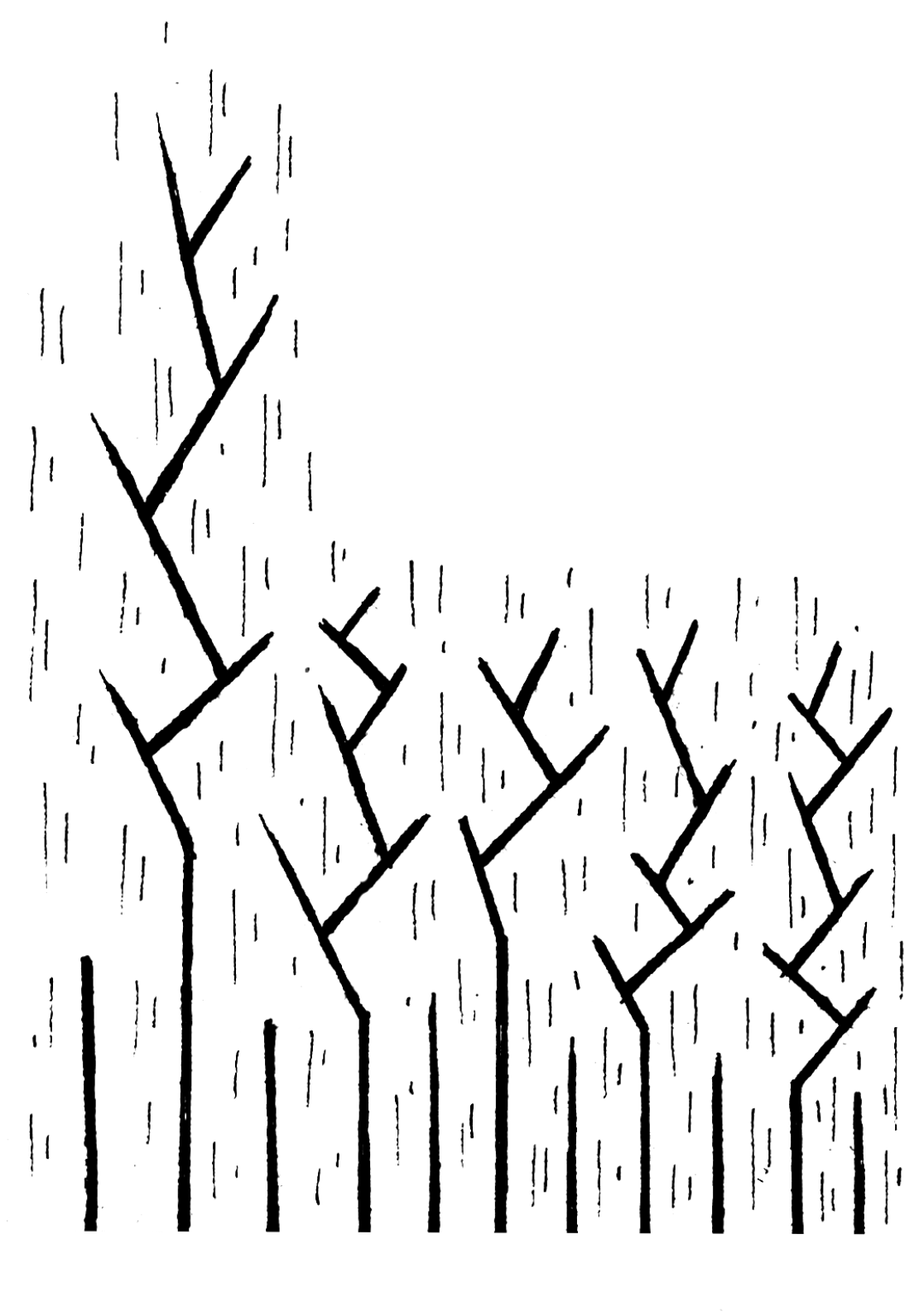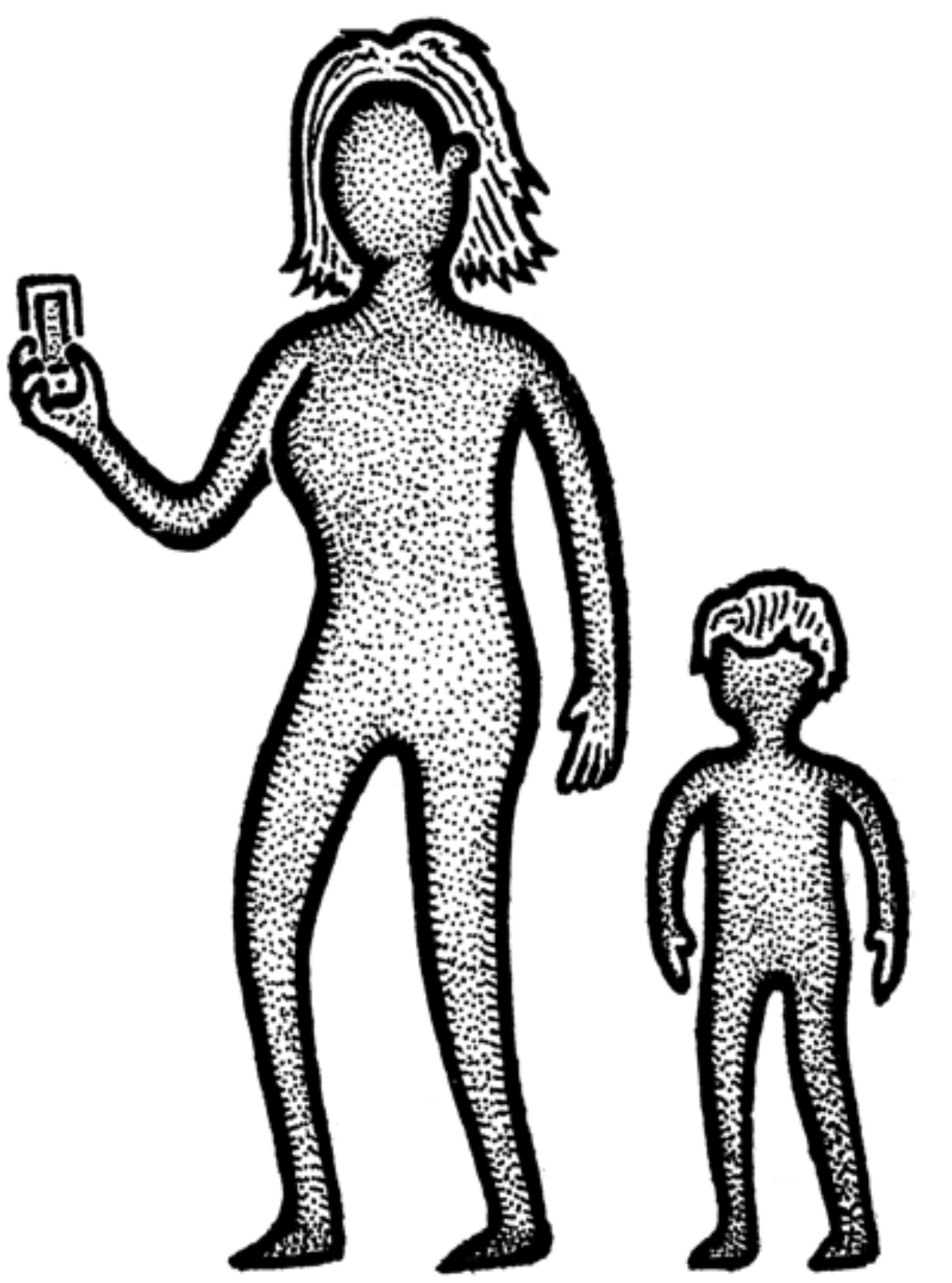
Unshaken, by JY Yang
Collective Fiction: We asked academics to collaborate with science fiction writers to develop short stories that explore the ideas of collective intelligence. This is the second story in the series. The first, and an introduction to the project, can be read here.
Miyuki was the first to notice the boy crying on the sidewalk.
She had been in Toranoana when the earthquake struck, the walls swaying, booklets and vintage CDs spilling off the shelves. She knew it had been a serious one becaure the lights had gone off and didn't immediately come back on. Still dizzy and shaken from the jerky movements, she had felt her way down Toranoana's winding and narrow stairs by phonelight.
One of the walls had cracked and the floor was littered with a quake-spill of flyers. Despite all that, the single file of customers circulating down to ground level was orderly and unhurried. Most of Akiba was old, built at a time when building codes were solid and looked-after, so they were not as worried. Someone two floors below her had even started livestreaming his descent on Niconico. His voice echoed upwards, oddly cheerful in the confused dark, addressed to his viewers, but it felt like it was addressed to them too. His voice was familiar and Miyuki wondered if she recognised his channel. She briefly considered livestreaming too, but she realised her audience might not be interested in this kind of thing. She could recount it later, when she got home.
Then she got out on to the street and saw the boy. Maybe it was because he reminded her of her little brother back in Fukuoka, but when she saw him it was like something had pierced her heart. While the other customers stumbled away down the ruined street, she went up to him and tried to calm him.
Akihabara was a mess. Cars had stopped suddenly and some of the pavements were cracked, but that wasn't the scary part. It was the microconstructions, the modular shops and housing that, for the past few years, had started to fill the gaps between Tokyo's tightly aligned buildings. From above, the city had begun to look more and more like a solid block; some days Miyuki felt like she could go days without ever seeing the sun.

Now it seemed that the people's fears about the rapidly expanding fronts of maikukon were correct: they were built too fast and were not safe. Down the street the heavy belly of the maikukon layer had sagged to the ground, like a drunk's. Exposed wires sparked.
The crying boy had clearly gotten off the autobus stalled by the street. Its white door was still open, and a polite computer voice was still saying, "Respected customers, due to unfortunate circumstances, the operation of this autobus has to be terminated. Please accept our deep apologies and seek out another form of transport. Respected customers… "
"Are you OK?" Miyuki asked the crying boy. "Are you hurt somewhere?"
The child was hysterical, his sobs lost under announcements and the sound of shifting rubble. Eventually she caught "Mother" between gasps.
"What happened to your mother? Was she on the bus?"
"She's waiting for me at Shibuya station."
The boy couldn't have been more than six or seven, and he was wearing an elementary school uniform. She knelt in the rubble to meet his eyes and smile, thankful for all the practice livestreaming had given her in delivering confident, cheery smiles to her channel no matter how exhausted or stressed she was. She ignored the creaks as the maikukun across the street bent under rubble and the bus’s apologies and met the boy’s streaming eyes.
"My name's Miyuki. What's yours?"
"Taro." It was hard to make it out through his sobs.
"Right, Taro-chan. It's OK. Shibuya station is not far from here – I can walk there together with you. Is that OK?"
Taro looked at her. "Together?"
Miyuki nodded.
He nodded, his crying tapering off to the occasional heave.
"OK, let's go! Stick close to big sister Miyuki."
Also in this seres
Fiction: Elevated, by Tim MaughanBut that was easier said than done. A hundred metres ahead was where the maikukon layer had collapsed, and while it looked like there was still some space to squeeze by underneath on the pavement, Miyuki didn't want to risk it. Who knew what would be on the other side? And if there were aftershocks, which there would definitely be with an earthquake this big, the maikukon might collapse even further. Miyuki wondered what had happened to the people trapped inside and turned away before Taro could have the same thought.
Miyuki was suddenly glad that her family was all in Fukuoka, out of this mess, and that her best friend Naoko worked as a cashier on a ground-floor shop. She had only been a few years old during the big earthquake in 2010, but she had learned about how bad it had been in school, later.
No, no. She couldn't get scared now. She had to be strong, for Taro's sake.
"It looks like the fastest way to Shibuya station is blocked," she told him. "So we have to walk around it. Don't worry, it won't take long."
Suddenly Miyuki knew exactly where she should turn to in this situation. DaDaNet.

DaDaNet began as a series of pranks that originated from 2ch. About four or five years ago, smart billboards started becoming common in Tokyo's shopping districts. The billboards came with cameras that could detect your face, guess your age, your gender, even your occupation and your mood. Then the billboard would change the advertisement to suit you. If it saw a crowd of people, it would tailor the advertisement to the largest or most profitable demographic in the group.
That was fine, of course, at first… but people got angry when shops started tracking what people bought, and where, and tying it to their credit card purchases at home. Then the city’s streets’ shop windows started reflecting the products you looked at yesterday, worn by a friendly rendering of your favourite celebrity, greeting you by name. Or not, if someone the screen predicted might spend more money walked past at the same moment as you. People’s hobbies, secret hopes and interests were revealed, their social connections, their love interests. People complained, but the billboards made too much money for a few fines to get them taken down.
Someone on 2ch started a thread for people to share videos of them tricking the smart billboards. They tricked the machines into thinking they were a 70-year-old grandmother, a salaryman having a bad day, and so on. It became a fad. People would do ridiculous things like dress up as anime characters or put on horse-head masks, that sort of thing. Somebody wore a mask of the then-prime minister and got an ad for women's perfume. That one went viral.
Sign up to our newsletter
Because the billboards gave different results depending on where they were located, users started wondering if they could arrange the videos by location. And so DaDaNet was born. The user who had first created it – an anonymous person known only by their handle 'Boshi' – named it after the 20th-century European movement that celebrated nonsense and anarchy. Users navigated the site using a map of Tokyo, clicking on locations to see what videos and comments had been left there. Of course, you could also follow individual users to see all the videos they had uploaded.
DaDaNet started as fun, but quickly became something more. Like 2ch, most of the users there remained anonymous. People used it to warn others about police checks or rude shop assistants. Sometimes they would leave lovelorn messages at certain locations: "I saw you, but I was too shy to say anything." They would leave tips for one another, or organise flash mobs. DaDaNet loved a flash mob.
Miyuki had an account on DaDaNet as 'Nikita'. She used it to find out things that were useful for her job as a fashion blogger. Hidden boutiques and such. She liked the Tokyo she found in the depths of the site.
Now, amid the rubble and sirens, as she logged on she found the opening map already littered with warning signs: places where there were roadblocks because of accidents, buildings in danger, broken ground and fallen trees. A few users had already reported the maikukon collapse that was blocking her way in Akiba. Despite everything, Miyuki almost smiled. There must be fellow DaDaNet users nearby. She felt less alone.
Based on the warnings on the map, Miyuki realised that if she took a side alley about 300m in the opposite direction of the maikukon collapse, she could reach Shibuya station in no time.
"Come on," she told Taro, "this is the safe way."
Taro walked briskly beside her. He seemed unwilling to hold her hand, which was all right because it left her free to check her phone. The updates were coming thick and fast on DaDaNet. So many maikukon had collapsed across the city that the rescue services were having difficulties moving around, much less getting help to people. Users were stepping in, swapping tips, appealing for help, offering help. At least something was happening.
Miyuki sent a message to her mother in Fukuoka to let her know that she was OK.
"Your shoes are pretty," Taro said as they walked.
"Thanks," Miyuki said. "It's my job, I write about fashion."
"All your clothes are very pretty."
"Are you interested in fashion, Taro-kun?"
"Only a little. My older sister has magazines and I sometimes read them."
Most popular this month
Fiction: Divided we stand, by Tim Maughan How Scotland is tackling the democratic deficitThat was enough for her. Miyuki started to chat with Taro about what brands he liked. She had to do it to keep the boy distracted, because she could hear the distress of the people around her. People on their phones, their voices full of worry, people trapped inside their cars… as they passed by the darkened shopfront of a combini, its insides in shaken disarray, Miyuki heard a woman crying for help in the maikukon above her. The unit had been pressed askew and its circular windows were completely cracked; Miyuki couldn't see what was happening within.
The woman cried, "Please help!"
Her heart pulsed strangely in her chest. "Hang on, Taro-kun," she said, interrupting his prattle. "I have to do something."
She tapped at her screen, marking her location on DaDaNet. She left a note that somebody here needed help. Little red flags such as hers were springing up all over the map. There were some that had turned green, meaning that help had gotten there.
"Please hold on," she shouted up to the woman, "I'm sure help will be coming soon!" She hoped the woman could hear her; she wasn't sure what else to do. She didn't know how to get up into the maikukon, and besides she had Taro to look after.
"I've marked your location," Miyuki shouted. "Someone will come soon."

It broke Miyuki's heart to leave her behind. It struck her then, that there had to be hundreds of people who needed help, thousands even. Miyuki had to do what she could. She promised herself that she would come back and try to help after she'd helped Taro find his mother.
They got to Shibuya station to find the square around Hachiko's exit swarming with people. Office hours had just ended and the trains had been full when the earthquake struck. JR had suspended all the train lines, spilling its contents onto the broken streets of Tokyo. Police drones flew overhead, issuing a string of instructions indistinct over the vibrating anxiety of the crowd.
Miyuki had a moment of panic as she realised Taro's mother might be stuck on a road somewhere and not able to come. Finding her would be a big task. She held on to Taro's shoulders as they scanned the crowd. "Do you see her?"
Taro stood silent, shaking his head. And then –
The boy shot forward, darting through the gaps between briefcase-toting salarymen. A woman, tall and splendidly dressed, turned around, eyes wide with relief as she recognised her son. "Taro! Are you all right? I was so worried when I heard all the autobuses were suspended… I didn't know who to call!"
Miyuki made her way through the jostling, gently frantic crowd. Taro pointed to her. "Big sister Miyuki brought me here. Using her phone!"
Miyuki felt awkward as the woman turned to her with grateful eyes. "It's nothing," she said, "I did nothing. I just used a map." She giggled nervously. "I guess you should thank all the people who contributed to it."
"Thank you for bringing Taro here. He's young, so he doesn't have a phone yet. I was afraid he would be lost."
"No problem. Hey, Taro-kun," she said, addressing the boy, "I was glad to have met you. Maybe some day you can come on my Niconico channel to talk about what brands you like, all right?"
Taro nodded.
"I want a phone like big sister Miyuki," Taro said, as they walked away. Miyuki watched them as they were subsumed into the crowd. At least some things were going all right today, she thought.
Miyuki traced her footsteps back to where she heard the woman in the maikukon. As she approached, she saw a handful of people had gathered underneath it. A man and woman held a store ladder up to the sagging belly of the construct, while another man was balanced on the top with a crowbar, prying the cracked windows off the frame.
The man on the ladder was wearing a Lawson uniform, and the two people holding the ladder were dressed like office workers. Just volunteers.
"Careful," a woman shouted to him from the bottom, "don't pull it too far, it will fall off… OK! Yes, like that!" Miyuki saw that the woman was relaying instructions from a man gesturing on her phone screen – an expert too far away to help in person, answering questions over DaDaNet.
The gap was just wide enough for the trapped woman to crawl through. She looked pale and shaken, and blood decorated her forehead, but she still managed to climb down the ladder with help from her rescuers.
"Can you stand?" the woman at the bottom of the ladder asked her when she reached the ground. She was shaky on her feet, but she nodded.
"If you're all right," the other man said, "we'll move on to others who are trapped. There's a medical station being set up a few streets away." He pointed. "If you have a phone, I can show you where… "
Miyuki stepped up. "I have a phone! I can take her." She knew where she could find the information.
"Your voice sounds familiar," the woman said. Someone handed her a tissue packet for her bleeding forehead. "Were you the one with the child from earlier?"
"That was me!" Miyuki beamed. "He's with his mother now."
"Thank you for alerting those people," she said.
"I'm glad I could help," Miyuki said. In times like these, everyone had to do what they could. "Come, let's go. I’ll show you how I did it along the way."